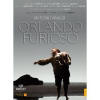Texte paru dans: / Appeared in:
*
International Record Review -
Pour
s'abonner / Subscription information
Naïve
RV728 (DVD)

0822186021484
Consultez toutes les évaluations recensées pour ce cd
~~~~ Reach all the evaluations located for this CD
The characters from Ariosti’s poem who appear in Vivaldi’s Orlando furioso should be known to lovers of Baroque operas, especially of Handel, for in his Orlando one finds the eponymous figure, Angelica and Medoro, whilst Alcina, Ruggiero and Bradamante are met in Alcina.
One might name a cast to match but hardly surpass that which performs in this production from the Théâtre des Champs-Elysées, which the details on the back of the box state is in Paris and then add ‘(France)’. Oh, that Paris! No weak component mars the line-up, all are on good form, and the spirited Ensemble Matheus and Jean-Christophe Spinosi augment the high standard. The recorded sound is fine, but in some scenes Alcina’s sorcery should have been employed to improve the lighting. In the opening scene, dimly illuminated, we have white, black and grey costumes against a background of grey, black and white. More colour in the clothes would have helped viewers to distinguish the characters sooner and more easily.
One external complaint is that the substantial booklet contains no track list. I looked through carefully but the more I looked the more I couldn’t see one. Why is it omitted? On the other hand, Naïve most be congratulated on presenting the whole opera, lasting 3 hours 10 minutes, on one DVD.
In 2004-, the same label issued a live performance of Orlando furioso as a CD set (reviewed in February 2005). Spinosi and his orchestra and four of the soloists are to be found on both recordings. The conductor and Frédéric Delaméa have reconstructed a performing edition based on Federico Maria Sardelli’s critical edition, which is markedly different from Claudio Scimone’s version used on the 1977 Erato LPs with Marilyn Horne and Lucia Valentini Terrani. Do not try to follow what is song on the new DVD by using the Erato libretto - One will need the Naïve CDs, for inexplicably Italian subtitles are not provided; only English and French (another strange decision).
Quite a large amount of recitative is song, especially in Act 3, and it can become somewhat dull. I am not referring to that which forms Orlando’s mad scene, which is highly dramatic, particularly as performed by Marie-Nicole Lemieux, who creates a tour de force in dealing successfully with bravado arias and in her expenditure of physical energy as she portrays Orlando in the throes of his madness: no husbanding of her vocal resources here. As a very brief example, listen to the recitative ‘No no, ti dico no!’ on track 22 of the third act, where at the words ‘Il Gazarone’ (‘The Scoundrel’) she descends to her vocal nether regions. As one would expect, she has no trouble with the rapid flights of fioriture.
The other dispenser of clashing emotions is Alcina, splendidly sung and acted by Jennifer Larmore, who makes telling use of facial expressions, subtle rather than distorted, as the sorceress displays outward anger and hostility and suffers inward torment. The latter is so well conveyed in the Act 2 aria ‘Cosi potessi anch’io’, a long aria in which Alcina bemoans her inability to find someone whom she loves and who loves her: those inner torments are so convincingly expressed by Larmore that one actually feels a touch of sympathy. She too triumphs over the florid musical rise and fall with technical expertise.
The vocal delights do not end there, for other soloists perform with panache, each showing a worthy technique. Philippe Jaroussky is at his best, as one hears in his first aria, ‘Sol da te’, in which Ruggiero sings of his love, though not for his wife Bradamante but for Alcina, who has bewitched him. During this lengthy aria (almost eight minutes) a flute weaves among its fellow instruments and around the vocal line. Presumably it is the first-named flutist, Alexis Kossenko, whose performing is so pleasurable. In the role of Bradamante, Kristina Hammarström, one of four mezzos/ contraltos in the cast, sings with focused fluency in each of her four arias, her tone dark-hued and well supported, making a good complement to Jaroussky’s brighter timbre. The fourth member of that voice category is Romina Basso, whose presence in a cast has always been welcome to me. With a vocal colouring that is perhaps a touch darker than Hammarström’s, Basso too has the agility in her voice to deal with Vivaldi’s coloratura as Medoro seeks his beloved Angelica.
She has taken refuge on Alcina’s island to escape the persistent approaches of the paladin Orlando. Veronica Cangemi’s is an intense Angelica, particularly in the last act, where director Pierre Audi seems to have placed her in the same state of delirium as Orlando, and Cangemi’s acting matches his idea. The only soprano on board, she brightens the general sound and is as adept at singing clear decorative phrases and flourishes as her colleagues are. The second South American (from Chile against her Argentina) is baritone Christian Senn as Orlando’s companion Astolfo. Whereas Handel would probably have limited such a character to a single aria, Vivaldi allots three (one per act) to Astolfo, and Senn delivers them with warmth of tone and ease of production.
All is impressive from the vocal aspect, and Spinosi’s lively direction of the music is as inspiriting as his orchestra’s playing. Audi’s production has little change of scenery. A table and the upturned frame of a chair seem to be constant. He is better at drawing out the characters. The whole benefits from good sound.
Cliquez l'un ou l'autre
bouton pour découvrir bien d'autres critiques de CD
Click either button for many other reviews


